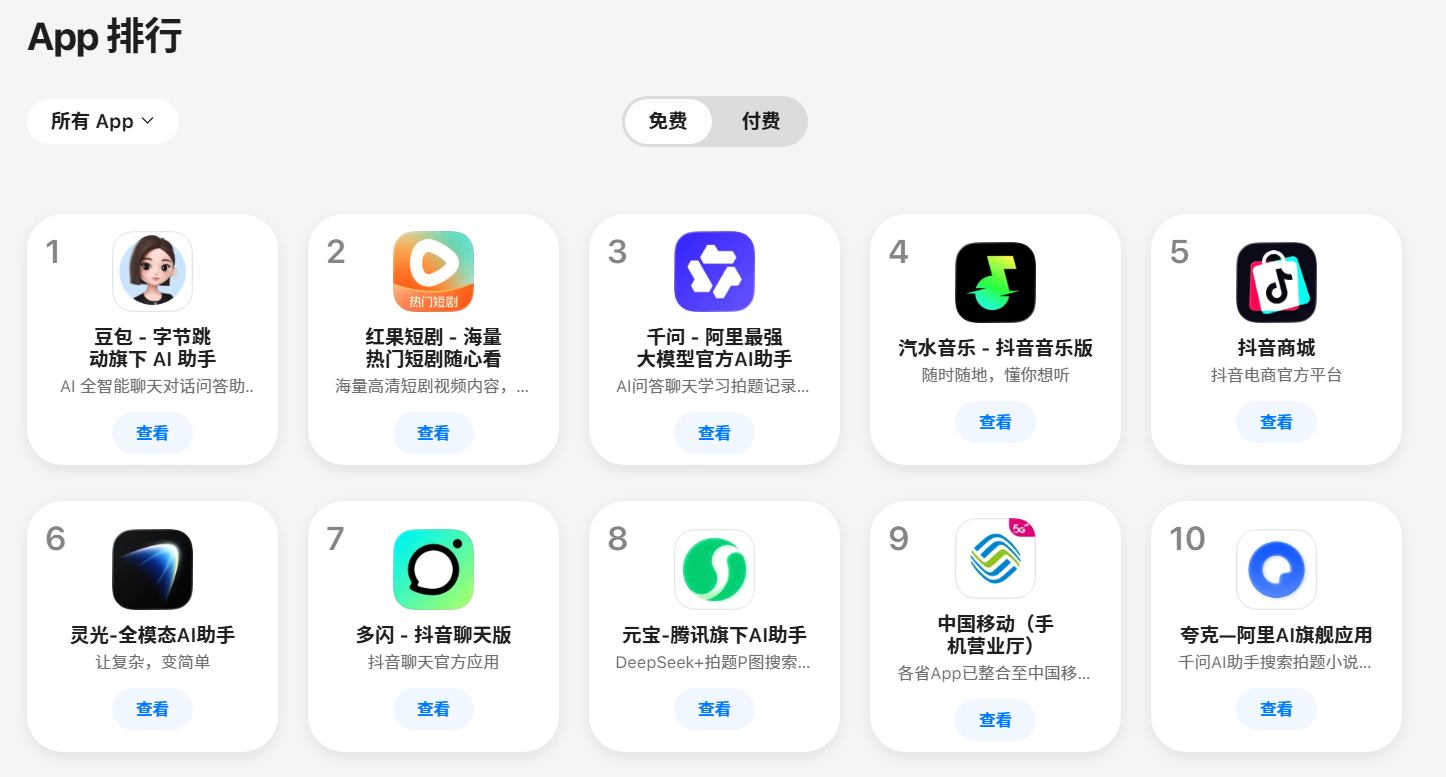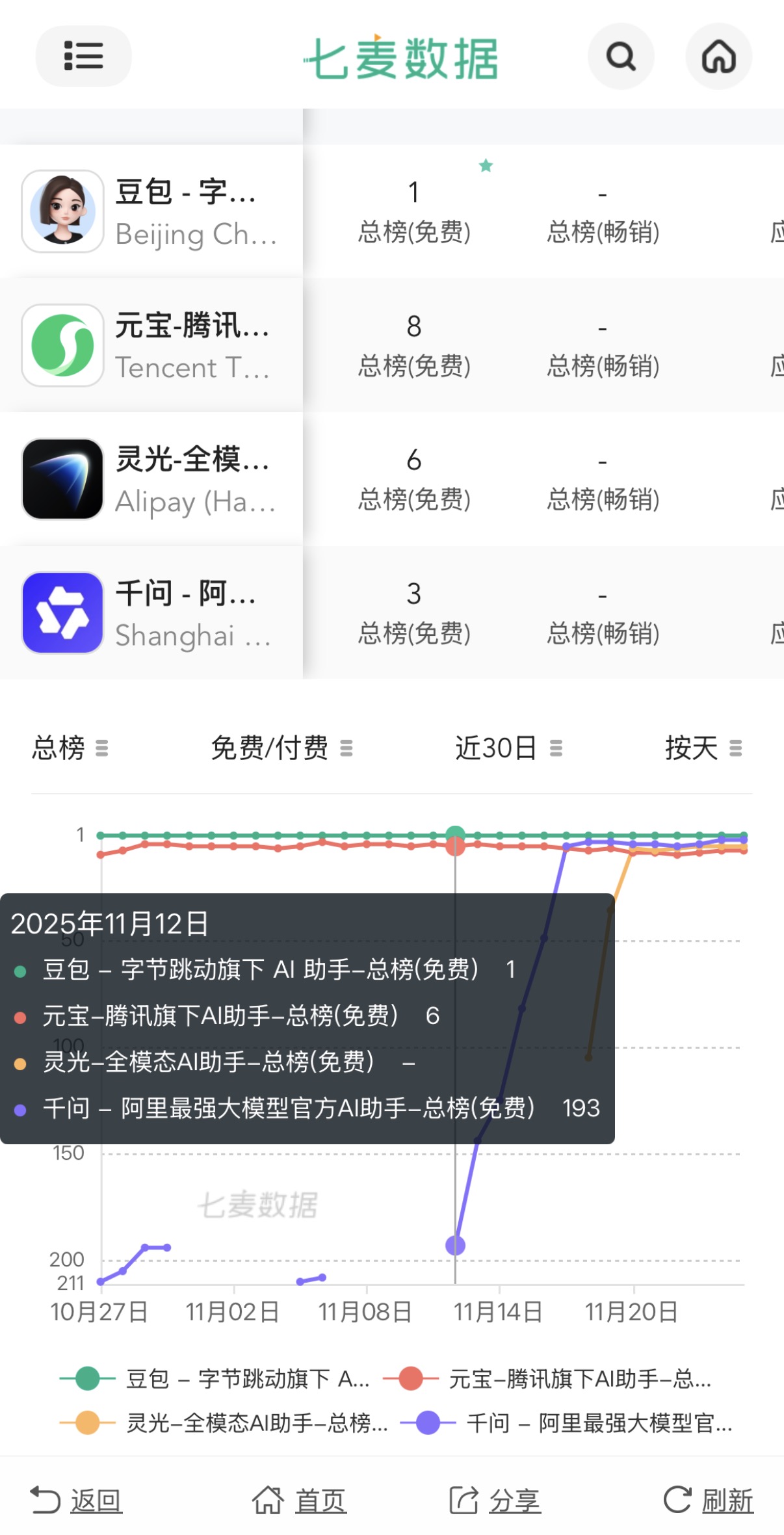Doubao, Qianwen, and Yuanbao Vie for Download Dominance: AI Assistants Claim Half of App Store’s Top Ten
![]() 11/25 2025
11/25 2025
![]() 492
492
Much like previous internet trends—such as O2O (Online to Offline), smart hardware, shared bicycles, fresh e-commerce, short videos, and cloud computing—the AI sector has emerged as the pinnacle of China’s internet industry by the end of 2025. Indeed, AI has already ignited multiple waves of domestic enthusiasm. After OpenAI’s ChatGPT took the world by storm, internet behemoths like Tencent, Alibaba, and Douyin (ByteDance) propelled a surge of AI large model products. The advent of DeepSeek further fueled another AI craze. Now, the AI assistant industry is undergoing another explosive surge, marking a true “clash of the titans.”
According to Guo Jing’s Internet Circle observations, on November 25th, AI assistants accounted for half of the top ten free apps on Apple’s App Store. Among them, Doubao (ByteDance) claimed the top spot, Qianwen (Alibaba) ranked third, Lingguang (Ant Group) sixth, Yuanbao (Tencent) eighth, and Kuake (Alibaba) tenth.

Unlike past horizontal comparisons in technology, AI assistants such as Doubao, Qianwen, and Yuanbao are now making waves by fiercely competing for download volumes. This “clash of the titans” came unexpectedly, with Doubao, Qianwen, Yuanbao, Lingguang, and Kuake suddenly intensifying their efforts to boost downloads.
Data from Qimai over the past 30 days reveals that the “chart-climbing game” for Doubao, Qianwen, Yuanbao, and Lingguang commenced on November 17th, coinciding with the launch date of the Lingguang App. Qianwen also surged into the top ten free apps on the App Store that day. Doubao and Yuanbao have maintained stable rankings, consistently appearing in the top ten free apps on the App Store over the past 30 days. Doubao has dominated the top spot for most of the past 90 days.

With Qianwen and Lingguang’s relentless sprints, the top ten free apps on the App Store have become crowded, creating an urgent situation for other AI assistant products.
Data indicates that as of November 1, 2025, China has witnessed 611 generative AI services complete registration, with 306 generative AI applications or functions registered.
Beyond Doubao, Qianwen, Yuanbao, Lingguang, and Kuake, numerous AI products from major companies and star startups abound, including Xunfei Xinghuo (iFLYTEK), Nano AI (360), Wenxin (Baidu), Kimi (Yuezhi Anmian), DeepSeek (Hangzhou Deepseek Company), and Keling (Kuaishou).
Reflecting on each wave of domestic internet trends, the so-called “XX the first year” merely marks the beginning. The true acceleration and consolidation phase often spans two to three years. The current AI industry, akin to past sectors like O2O, smart hardware, shared bicycles, short videos, and cloud computing, is also undergoing a “consolidation phase.” A significant reality is that the user market simply cannot accommodate hundreds of AI assistant products simultaneously. The industry’s “concentration effect” will lead to a winner-takes-all scenario, with some mid-to-low-tier products gradually being eliminated by the market.
The download volume battle among Doubao, Qianwen, and Yuanbao signifies a sudden “acceleration” process. The more companies that participate, the fiercer the competition and the harsher the outcome. Faced with hundreds of AI assistant products, the market may ultimately retain only a few, with the rest potentially fading away in the competitive landscape.
Given the current market situation, there’s no need to fixate on a product’s “X-day download volume.”
1. The competition won’t end anytime soon. With China’s internet user base reaching 1.123 billion and a 79.7% internet penetration rate, unless a company can steadily secure over 50% market share, it cannot be considered far ahead. This implies that everyone still has a chance to compete, and it’s just the beginning, not the end.
2. Current download volumes heavily rely on budget allocation. The recent surge is the result of significant budget investments by AI companies across various platforms, including splash ads, information feed ads, App Store ads, soft articles, and grassroots marketing. Heavy advertising spending by AI companies has driven substantial download volumes. Advertising itself is not complex; it hinges on which company is more willing to invest. With sufficient investment, climbing the App Store charts is not difficult.
However, this competition is also brutal. Major companies have the budget to boost download volumes, while smaller companies may hesitate to invest so aggressively. They already face high technical investment costs and normal market advertising expenses. But during this intense period of accelerated advertising spending, they may be pulled into a “quagmire”—either keep up or be eliminated.
3. Retention rates and user habits are more critical. Downloads are the threshold for user engagement, but true product success lies in retention rates and user habits. If users don’t use the app for a while after downloading, they may quickly delete it. In future competition, users may evaluate products based on their effectiveness and problem-solving capabilities. Additionally, users may consider overall market trends, i.e., the majority’s usage habits, which will also influence their final preferences.
For the domestic AI large model industry, there are also more pressing issues, such as profit models. AI large model products like ChatGPT, xAI, and Gemini have a crucial profit point: charging C-end users. The domestic AI large model market is highly competitive. Unless a product is exceptionally outstanding and effective, the current “one charges, others free” scenario makes it difficult to implement user fees, meaning they lack a vital revenue source.
Based on the development of digital music, online video, and web novel industries, domestic internet companies are more accustomed to expanding user bases and gaining dominant positions before charging users. If products like Doubao, Qianwen, and Yuanbao want to charge users, they will likely follow this path.
Compared to previous generations of internet products, the AI industry’s advantage lies in short video algorithm recommendations, which have accelerated information equality among domestic netizens. In the past, it took a long time for most people to know and use an internet product, but with short videos, a product can become popular very quickly. Additionally, the user education and market cultivation period for past products was long, but now, user habit cultivation cycles are much shorter.
Doubao, Qianwen, and Yuanbao only need to stay in the game to potentially reap the benefits of “user-paid” services in the future. For users, it’s important to cherish this period of free AI large model access.
By Guo Jing, WeChat Official Account: Guo Jing’s Internet Circle







